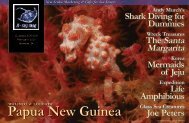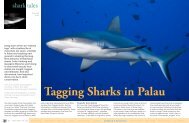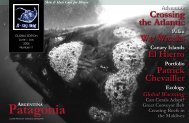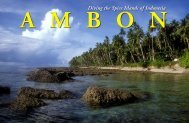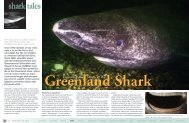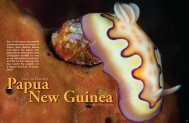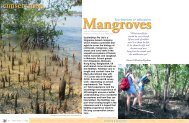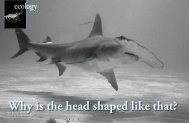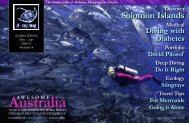Medium resolution version of X-Ray Magazine (96 dpi)
Medium resolution version of X-Ray Magazine (96 dpi)
Medium resolution version of X-Ray Magazine (96 dpi)
You also want an ePaper? Increase the reach of your titles
YUMPU automatically turns print PDFs into web optimized ePapers that Google loves.
news<br />
Edited by<br />
Peter Symes &<br />
Michael Symes<br />
Archival photo from<br />
www.patrickmusimu.com<br />
Whalesharks are shrinking<br />
According to a study by<br />
Australian scientists, the world’s<br />
largest fish, the whaleshark is<br />
getting smaller.<br />
Records show a reduction in<br />
the whalesharks’ average size<br />
from 7 meters in 1995 to around<br />
5.5 meters today. Although<br />
scientists do not know why this<br />
decrease is happening, speculation<br />
includes suspicions that<br />
over-fishing practices in unprotected<br />
international waters, a<br />
drop in average whaleshark<br />
age and injuries to the whalesharks<br />
caused by collisions with<br />
sea vessels could be to blame.<br />
Very little is known about this<br />
elusive, slow growing, planktoneating,<br />
highly migratory oceanic<br />
fish, which has been spotted<br />
in protected waters at Nigaloo<br />
Reef in Western Australia and<br />
occasionally ventures to a few<br />
coastlines around the world<br />
including those along Somalia,<br />
Kenya, the Seychelles and<br />
India. Scientists include this ‘top<br />
order’ animal as a barometer<br />
for the health <strong>of</strong> the ocean.<br />
At the International Whale<br />
Shark Conference in Perth this<br />
year, Dr Mark Meekan and<br />
colleagues who authored the<br />
report said, “They’re like the<br />
canary in the coal mine, so<br />
we do need to pay attention<br />
to the signals they are giving<br />
us... Any fish population<br />
that is undergoing<br />
unsustainable<br />
mortality<br />
usually<br />
shows<br />
a drop in<br />
average size <strong>of</strong> individual fish,<br />
and a drop in abundance.<br />
So what we’re seeing at<br />
Ningaloo is particularly worrying,<br />
because these waters are<br />
protected.”<br />
Scientists at the conference<br />
implored<br />
countries<br />
to work harder to protect the<br />
whaleshark and its habitat as<br />
well as move away from practices<br />
<strong>of</strong> harvesting the sharks to<br />
initiating more sustainable alternatives<br />
such as carefully managed<br />
ecotourism. ■<br />
Patrick Musimu freedives to an astounding 209.6m<br />
New record in<br />
freediving’s No-<br />
Limits discipline<br />
On breaking the magic 200m barrier, on<br />
June 26 2005, Patrick Musimu wrote in his<br />
journal: “Today, my team and I have succeeded<br />
a historical dive, 200m. Together<br />
we have demonstrated to the whole<br />
world that there is no limit to the plasticity<br />
<strong>of</strong> the human body in terms <strong>of</strong> adaptation<br />
when submitted to extreme environment.<br />
The real barriers are in our minds, we<br />
are our worst enemies in terms <strong>of</strong> future<br />
accomplishments. We tend to reject ideas<br />
and concepts we do not understand. In<br />
fact, ignorance is human worst enemies.<br />
We tend to reject<br />
ideas and concepts<br />
we do not understand.<br />
In fact, ignorance<br />
is humans’<br />
worst enemies.<br />
Ignorance leads to denial and fear and as<br />
demonstrated through the centuries, this<br />
fear <strong>of</strong> the unknown generates mental conflicts,<br />
which in term leads to physical ones<br />
and wars”<br />
209.6 meters The 200m dive was the<br />
set target but on June 30, after three days<br />
<strong>of</strong> resting, Patrick set out to claim yet another<br />
record when he on a dive that lasted<br />
3 min 28 s reached the depth <strong>of</strong> 209.6m.<br />
Screendump from the dive computer<br />
showing the pr<strong>of</strong>ile <strong>of</strong> the 209.6m dive<br />
Not recognised<br />
While no one questions that Patrick<br />
Musimu has indeed become the deepest<br />
freediver in the world—the dive was very<br />
well documented—there were no <strong>of</strong>ficials<br />
or judges from AIDA, The Association<br />
for the International Development<br />
<strong>of</strong> Apnea, present, and therefore the<br />
record cannot be recognised as an<br />
<strong>of</strong>ficial worldrecord.<br />
Pressrelease<br />
Coral Reef Restoration<br />
Workshop on Bali<br />
Global Coral Reef Alliance, Sun & Sea<br />
e.V.and Yayasan Karang Lestari have<br />
announced the Third BiorockT Reef<br />
Restoration Workshop at Taman Sari<br />
Resort, Pemuteran, Bali, November<br />
21-28, 2005.<br />
Workshop participants will experience<br />
hands-on training in the simple<br />
techniques to design, construct, install,<br />
maintain, monitor, and repair Biorock reef<br />
nurseries.<br />
The BiorockT Process, or mineral accretion,<br />
is a revolutionary technology that<br />
grows structures and marine ecosystems in<br />
seawater. It provides a cost-effective and<br />
sustainable method to accelerate coral<br />
growth and greatly increase coral survival<br />
from environmental stress.<br />
Biorock methods can restore damaged<br />
coral reefs, allow highly productive mariculture<br />
<strong>of</strong> corals, oysters, clams, lobsters, and fish,<br />
protect shorelines, and provide building materials<br />
from sustainable energy.<br />
The workshop will be conducted by Dr. Tom<br />
Goreau, President, Global Coral Reef Alliance<br />
and Pr<strong>of</strong>essor Wolf Hilbertz, President <strong>of</strong> Sun and<br />
Sea e.V., as well as several Biorock project managers<br />
and staff.<br />
The workshop will take place at the site <strong>of</strong><br />
the Karang Lestari Project, the world’s<br />
largest Biorock installation,<br />
in Pemuteran,<br />
Bali, Indonesia.<br />
For more<br />
information<br />
on the<br />
event see<br />
the Global<br />
Coral Reef<br />
Alliance<br />
website:<br />
www.globalcoral.org<br />
11 X-RAY MAG : 6 : 2005 EDITORIAL FEATURES TRAVEL NEWS EQUIPMENT BOOKS SCIENCE & ECOLOGY EDUCATION PROFILES PORTFOLIO CLASSIFIED<br />
Filephoto: www.patrickmusimu.com



